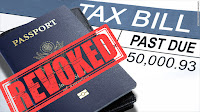 On July 17, 2018 we posted Don't Be 1 of the 362,000 Americans Waiting To Have Their Passports Revoked Because They Owe Back Taxes! where we discussed that the IRS issued Notice 2018-1 on January 16, 2018, which provides guidance for implementation of the new IRC 7345 and also discussed that the IRS webpage on Revocation or Denial of Passport in Case of Certain Unpaid Taxes contains the following alert:
On July 17, 2018 we posted Don't Be 1 of the 362,000 Americans Waiting To Have Their Passports Revoked Because They Owe Back Taxes! where we discussed that the IRS issued Notice 2018-1 on January 16, 2018, which provides guidance for implementation of the new IRC 7345 and also discussed that the IRS webpage on Revocation or Denial of Passport in Case of Certain Unpaid Taxes contains the following alert:
The power to recommend passport revocation for serious tax defaulters was granted to the IRS under the Fixing America's Surface Transportation Act, signed into law in December 2015, but only brought into effect in February 2018. The Internal Revenue Service has stated it plans to use the power against US persons who owe more than USD51,000 in taxes and penalties.
However, first the IRS need to send the taxpayer either a Notice of Federal Tax Lien or a Notice of Intent to Levy. Taxpayers receiving either notice are entitled to appeal to a Collection Due Process hearing, to negotiate a resolution of this debt.
Second, the IRS can apply for a passport revocation or denial only if it first notifies the taxpayer of its intention, and allows 30 days for a response. It can go ahead with the application only if this request is ignored or not satisfactorily answered.
The IRS also uses Form CP508C - Notice of Certification of Your Seriously Delinquent Federal Tax Debt to the State Department advising the taxpayer that:
tax debt is seriously delinquent.

We show that you still owe > $51,000.
This amount includes penalty and interest computed to
30 days from the date of this notice.
Even then, the taxpayer can halt the revocation by agreeing to pay the tax in instalments, or by offering a compromise. And in the last resort, where revocation is granted, the State Department will not actually execute it until 90 days after the grant, giving the taxpayer time to resolve it.
Payment Of Taxes
Passport Status

The IRS Will Reverse The Certification Within 30 Days Of Resolution Of The Issue And Provide Notification To The State Department As Soon As Practicable.
Travel
Sources
Read more at: Tax Times blog






